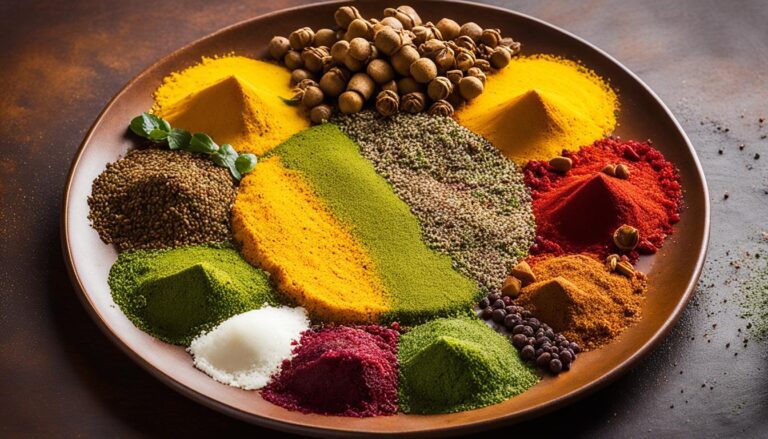What Spices Are Used in Ethiopian Food?
When it comes to culinary delights, Ethiopian cuisine stands out with its tantalizing flavors and aromatic dishes. But have you ever wondered what spices are responsible for creating these mouthwatering flavors?
From the rich and fiery Berbere to the vibrant turmeric, Ethiopian food incorporates a dazzling array of spices that awaken the taste buds and transport you to the heart of Ethiopia. These unique spices not only enhance the flavor of the dishes but also add depth, complexity, and a distinctive Ethiopian touch.
In this article, we will take a closer look at the key spices used in Ethiopian cuisine, uncovering their flavors, uses, and cultural significance. Get ready to embark on a flavorful journey through the world of Ethiopian spices!
Key Takeaways:
- Ethiopian cuisine is known for its rich and bold flavors achieved through the use of various spices.
- The essential spices used in Ethiopian food include Berbere, turmeric, Korerima, Tikur Azmud, and Nech Azmud.
- These spices contribute to the distinctive taste and aroma of Ethiopian dishes.
- Ethiopian cuisine also features spice blends like mitmita, adding depth and flavor to different dishes.
- Exploring the flavors of Ethiopian spices is a delightful culinary experience.
The Essential Spice Blend: Berbere
In Ethiopian cuisine, there is one spice blend that stands above the rest – Berbere. This versatile blend of spices is a crucial component in creating the distinct and flavorful profiles of Ethiopian stews and stir-fries. Made from a combination of various spices, including chile peppers, fenugreek, cinnamon, ginger, cardamom, and coriander, Berbere adds complexity and depth to dishes, creating a delightful explosion of flavors on the palate.
Using Berbere as an Ethiopian spice blend offers a convenient way to incorporate multiple spices into your cooking without the need for individual measurements. Its well-balanced combination of spices lends a unique and aromatic touch to any dish, making it a staple ingredient in Ethiopian cuisine.
Turmeric: The Vibrant Spice

Turmeric plays a significant role in Ethiopian cooking, adding both flavor and color to a variety of dishes. This vibrant spice is widely used in mild recipes and vegetable stir-fries, complementing the flavors of other ingredients. Its bright yellow hue not only enhances the visual appeal of the dishes but also adds a touch of warmth to the overall presentation.
Aside from its culinary benefits, turmeric also offers numerous health advantages. It is well-known for its anti-inflammatory properties, as well as its potential to boost immunity and promote overall well-being. Consuming turmeric regularly can be a wonderful way to incorporate the benefits of this powerful spice into your diet.
Korerima and Tikur Azmud: Flavor Enhancers

In Ethiopian cooking, Korerima, also known as black cardamom, holds a special place as a beloved spice. Its distinct flavor adds an exquisite touch to stews and stir-fries, elevating them to new levels of deliciousness.
Another essential flavor enhancer in Ethiopian cuisine is Tikur Azmud, or black seed. This spice imparts a subtle aroma to dishes and is often paired with Berbere, another popular Ethiopian spice blend. Tikur Azmud adds depth and complexity to the flavor profile, enhancing the overall dining experience.
You can find both Korerima and Tikur Azmud in Ethiopian stores, conveniently available in either whole seed form or ground. Experiment with these traditional Ethiopian spices to recreate authentic flavors in your own kitchen and delight your taste buds with the wonderful nuances they offer.
Nech Azmud: Nutty Flavor Enhancer
In Ethiopian cuisine, Nech Azmud, also known as ajwainee seed, is a prized spice that adds a delightful nutty flavor to various dishes. As a flavor enhancer, Nech Azmud complements mild dishes and those cooked with turmeric, infusing them with its unique aroma and taste.
When using Nech Azmud, it’s important to exercise caution, as a little goes a long way. Due to its potent flavor, it is recommended to start with a small amount and adjust according to personal preference.
You can find Nech Azmud in Ethiopian, Mediterranean, and Indian grocery stores. Typically, it is sold as whole seeds, which can be toasted and ground at home to retain maximum freshness and flavor.
Discover the Versatility of Nech Azmud
Thanks to its nutty fragrance, Nech Azmud adds depth to a wide range of dishes. From lentil stews and vegetable stir-fries to rice pilafs and curries, this Ethiopian spice complements various culinary creations.
Its versatility extends beyond Ethiopian cuisine, making Nech Azmud a valuable addition to any spice collection. Whether you’re a seasoned chef or an amateur home cook, experimenting with Nech Azmud can elevate your dishes to new heights.
Spice Blends and Soloists in Ethiopian Cuisine
In addition to individual spices, Ethiopian cuisine is known for its delicious spice blends that bring depth and complexity to dishes. One popular blend is mitmita, a fiery finishing spice made with bird’s eye chilies, ajwain, koseret, and salt. This aromatic blend adds a spicy kick to various dishes and is a staple in Ethiopian cooking.
Other soloists in Ethiopian cuisine include korerima, also known as Ethiopian black cardamom, which has a unique flavor that complements stews and stir-fries. Timiz, or Ethiopian long pepper, adds a mild and slightly sweet heat to dishes, while besobila, also known as holy basil, brings a fresh and herbaceous note to the cuisine.
These spice blends and soloists are essential components of Ethiopian cooking, offering a wide range of flavors that elevate the taste of traditional dishes. Whether you’re preparing a hearty Ethiopian stew or a simple stir-fry, exploring these spice blends and soloists will enhance your culinary experience and transport you to the vibrant flavors of Ethiopian cuisine.
Conclusion
Ethiopian cuisine offers a tantalizing array of unique flavors that are a result of the skillful use of Ethiopian spices. The essential spices used in Ethiopian food, such as Berbere, turmeric, Korerima, Tikur Azmud, and Nech Azmud, work together to create the rich and aromatic nature of Ethiopian dishes.
These flavors are not only delicious but also provide a delightful culinary experience that is sure to excite the taste buds. Whether you’re cooking Ethiopian food at home or dining at an Ethiopian restaurant, exploring the vibrant flavors of Ethiopian spices will transport you to the heart of this diverse and captivating cuisine.
Immerse yourself in the bold and distinctive tastes of Ethiopian cuisine by experimenting with these unique spices. From the fiery heat of Berbere to the nutty notes of Nech Azmud, each spice adds its own depth and character to dishes, creating a culinary adventure like no other. So, don’t miss out on discovering the exceptional flavors that Ethiopian cuisine has to offer.







